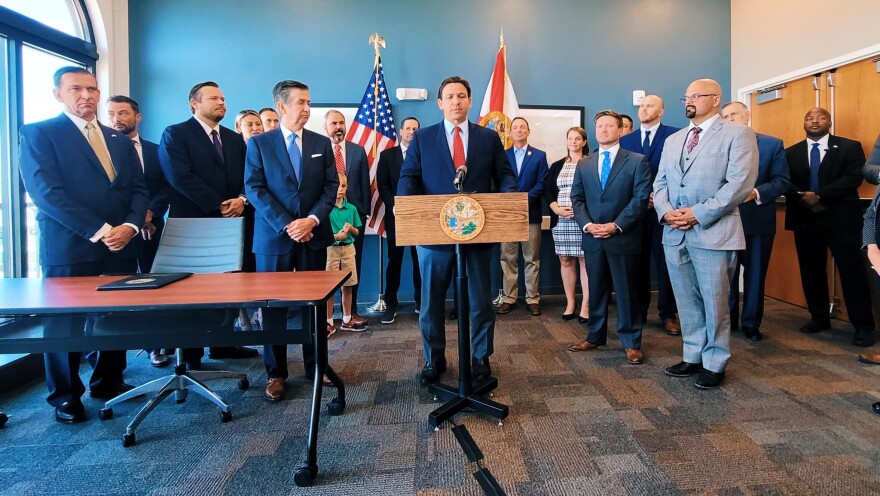Governor Ron DeSantis signed a property insurance reform bill into law, June 11, following a roundtable discussion in Sarasota. Supporters of the measure say it will drive down property insurance rates in the long run, but opponents argue it will do just the opposite as well as make it easier for insurance companies to deny claims.
SB 76 makes a number of changes to property insurance law: It reduces the window of time that an initial claim can be filed from three to two years, with an additional year for supplemental claims. It also requires homeowners to give their insurance companies 10 days-notice before filing a lawsuit.
The new law changes how attorney fees are paid in cases of insurance claim litigation and prohibits contractors from using advertisements aimed at encouraging homeowners to file claims. It also bars contractors from offering incentives to homeowners to allow them to conduct free roof inspections. Contractors who violate those provisions could now face fines of up to $10,000.
Bill sponsor, Sen. Jim Boyd, R-Bradenton, who owns and operates the company Boyd Insurance & Investments, said addressing unscrupulous contractors and litigation costs are key to reducing property insurance rates.
“Between 2013 and 2020, $15 billion dollars in claims were paid out to Florida in property insurance claims. 71% of that $15 billion went to the lawyers. Eight percent went to homeowners for their claims. Something is wrong with that picture,” said Boyd.
State Rep. Bob Rommel, R-Naples, was also present for the bill signing and addressed concerns about the cost of insurance claim litigation.
“Florida represents about eight percent of the population of the United States, yet we represent 76% of every lawsuit regarding property and casualty in America. So, we knew there was a problem there, but when you have so much money behind one thing, its very difficult sometimes to change the policy.”
DeSantis signed the bill following a roundtable discussion with Republican state lawmakers, and other bill supporters, including representatives of the insurance, real estate, construction and banking industries.
Political and Communications Director for the nonprofit Progress Florida, Damien Filer, said that context is worth noting.
“I think in this instance what you’re seeing are the stakeholders that the governor is beholden to and unfortunately, even though he was elected by the people of Florida, it doesn’t appear that that’s who he considers his constituency to be,” said Filer.
“I think that he looks at his constituency as those insurance companies and bankers and other large corporate interests that bankroll his campaigns to be the one whose interests he’s serving.”
Filer says the bill is part of a larger pattern of the DeSantis administration increasing the financial burden on taxpayers including a new 12% cap on impact fees local governments can charge developers, leaving property owners on the hook for the cost of expanding infrastructure like roads and sewer lines.
“I think that people in this state should have real concerns about this and I think that they should just know in plain speak that their taxes are going to go up. There’s going to be less money in their pockets than there would have been before,” said Filer.
As this bill made its way through the legislative committee process, lawmakers heard from frustrated Floridians whose homes were damaged by Hurricane Michael and who say they only resorted to filing lawsuits because their insurance carriers refused to adequately cover the cost of needed repairs. They, along with some consumer advocates argue the insurance companies themselves are responsible for their financial woes and industry instability.
Senator Boyd predicts it will take a year to 18 months before Florida homeowners begin to see their insurance rates decrease.
In the meantime, the new law will allow the state-backed Citizens Property Insurance Corp. to increase annual rate hikes from 10% to 15% on the roughly 600,000 policies it currently provides. Citizens was designed to be the insurer of last resort for homeowners who could not find affordable policies in the private market. Since 2018, Citizens has added about 180,000 new policies.
Rep. Rommel said some insurance companies that don’t currently provide coverage in Florida are starting to show interest because of the new law.
Copyright 2021 WGCU. To see more, visit WGCU.





